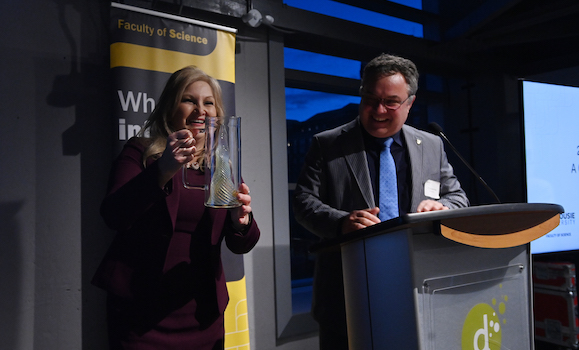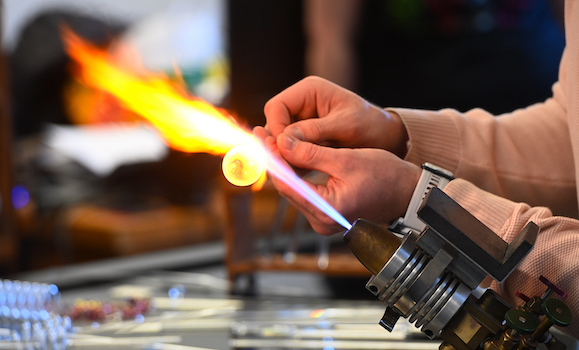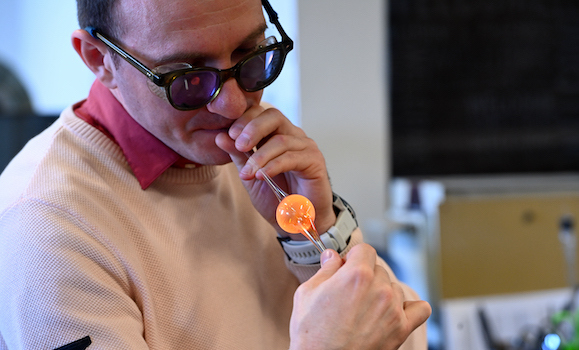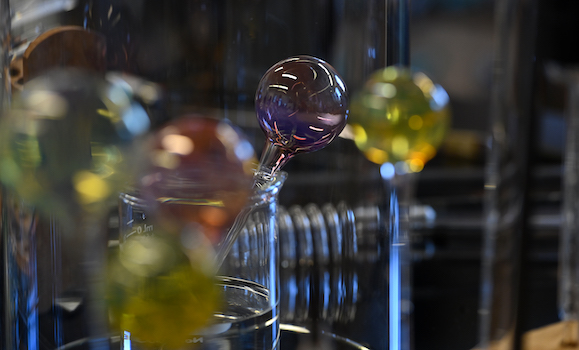For Ihor Krasilia, sticking his hands near a fire is part of his daily routine as ±«Óătv’s new scientific glass blower.
Glass blowing requires precision, dexterity, control, and most of all, patience. Krasilia joined the Dal community in November with more than a decade of training and experience. As the university glassblower, he crafts specialized glassware for the research community and one-of-a-kind gifts from the glass-blowing lab on the third floor of the Chemistry Building.
With temperatures higher than 500 degrees, Krasilia adds that it’s a different kind of heat that “you have to feel with your eyes.”
Backstory
Krasilia is originally from Ukraine and studied economics at the Kharkiv Institute of Business and Management. A friend suggested Krasilia join him in trying glassblowing and start a small business. Krasilia completed a scientific glassblowing course at the National Technical University and within six months, sold his first piece.
The pair made decanters, lampshades, pipes, hookahs, and other small souvenir sculptures. Krasilia then sought out mentors and additional training to learn how to make laboratory items, such as beakers, tubes, and Klein bottles.
He started working at the Kharkiv Polytechnic Institute in the Ukraine where he spent the next seven years making glassware, training students, and hosting master classes for groups of 20-50 people, including children.
After Russia launched an invasion of Ukraine in February 2022, Krasilia remembers “I would make something out of glass and then a rocket would fly overhead.” He knew that his family was not safe and faced an impossibly difficult decision. His wife moved to the Netherlands where he would later join and work for a company that manufactures combustion analyzers — instruments designed to measure the gases in a combustion process — and accessories with a dedicated glass facility.
A friend in Manitoba, also from the Ukraine, recommended Canada as a beautiful and stable country. Canada introduced open work permits for Ukrainians and their family members, and Krasilia was then connected to ±«Óătv.
Coming to Canada
It is common for government organizations and research universities to have dedicated glassblowers. The role fills a niche, but important role in crafting — and repairing — glassware for research experiments.
Sheila MacLean, manager of recruitment and retention in Human Resources, says the search for a new glassblower — Dal's previous one, Todd Carter, moved on in the fall of 2020 — was more challenging than some recruitment processes as it's for such a specialized role. She commends her team for their diligence and collaboration throughout the process as they discovered a great candidate.
“We were thrilled at Ihor's candidacy. He is a highly trained scientific glassblower with experience working at universities, most extensively in his Ukrainian home,” she says.ĚýĚý
When speaking about the experience arriving at ±«Óătv, Krasilia says “Everything is possible because Danielle helped.” He is referring to Danielle Pottie, the administrator for the chemistry department. Pottie supported the recruitment process and later, with Krasilia’s local housing search. She also sourced donations to furnish his apartment.
In his first month in Canada, Krasilia shares that he ran over 200 kilometers. “The ocean and nature are beautiful,” he says.
His wife and now seven-month-old baby joined him in Canada on Christmas day.
What's next
Krasilia is keen to connect with the ±«Óătv research community about design and production abilities within the glass-blowing lab.
Having a glassblower on campus also opens a unique opportunity for one-of-a-kind gifts. The Faculty of Science recently commissioned Krasilia to create a custom, weather-themed gift for CBC meteorologist and Dal alum Tina Simpkin (BSc’94, DMET’95), who served as a guest speaker at two Faculty events in March.

As he did in the Ukraine, Krasilia also hopes to provide masterclasses and public demonstrations for students and the broader ±«Óătv community.
Learn more about resources and facilities in the Department of Chemistry.
Ěý




